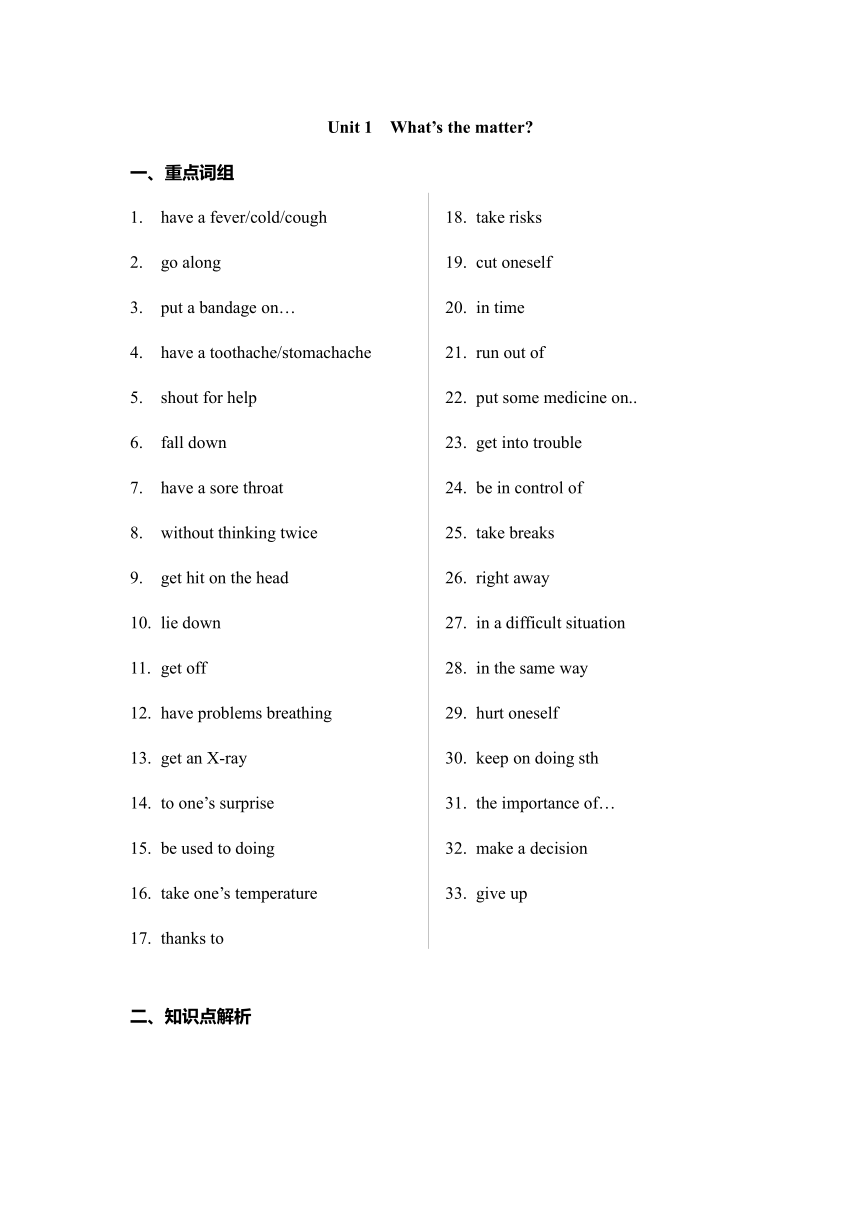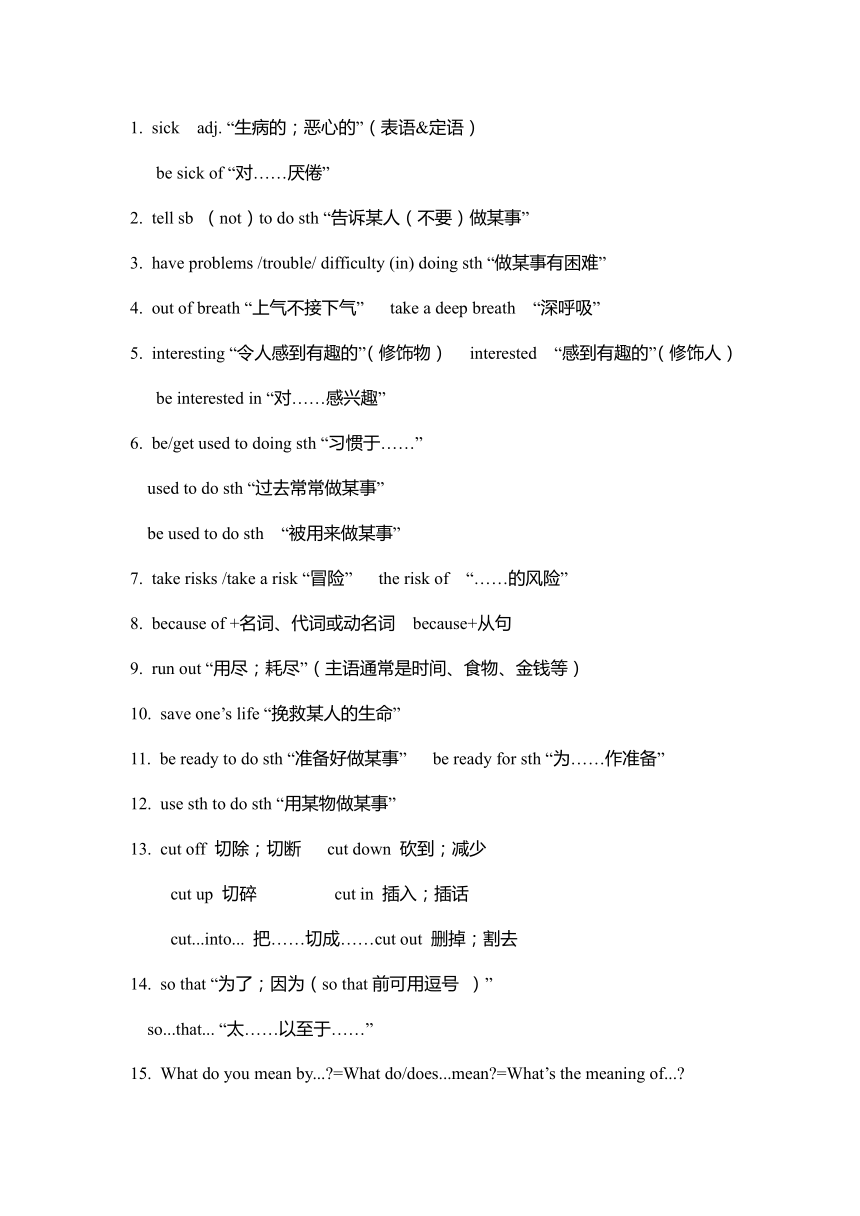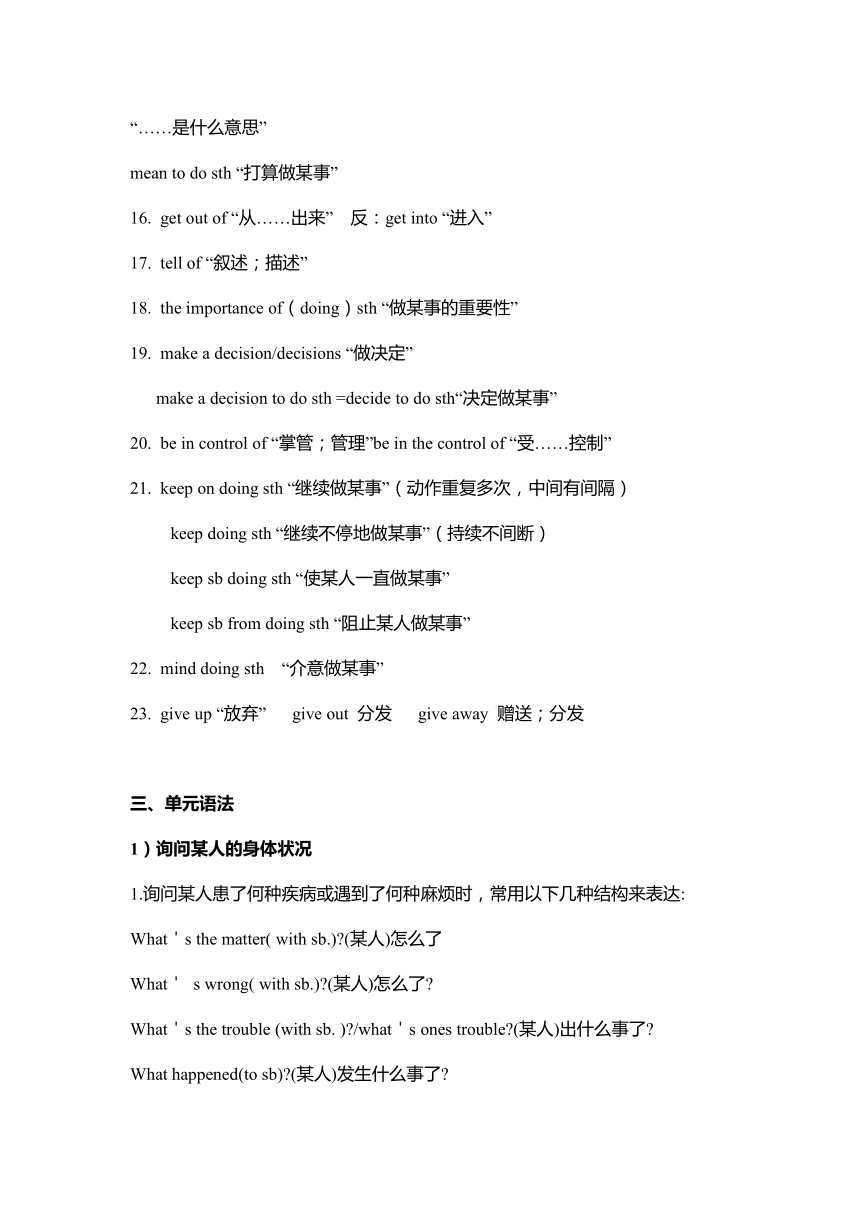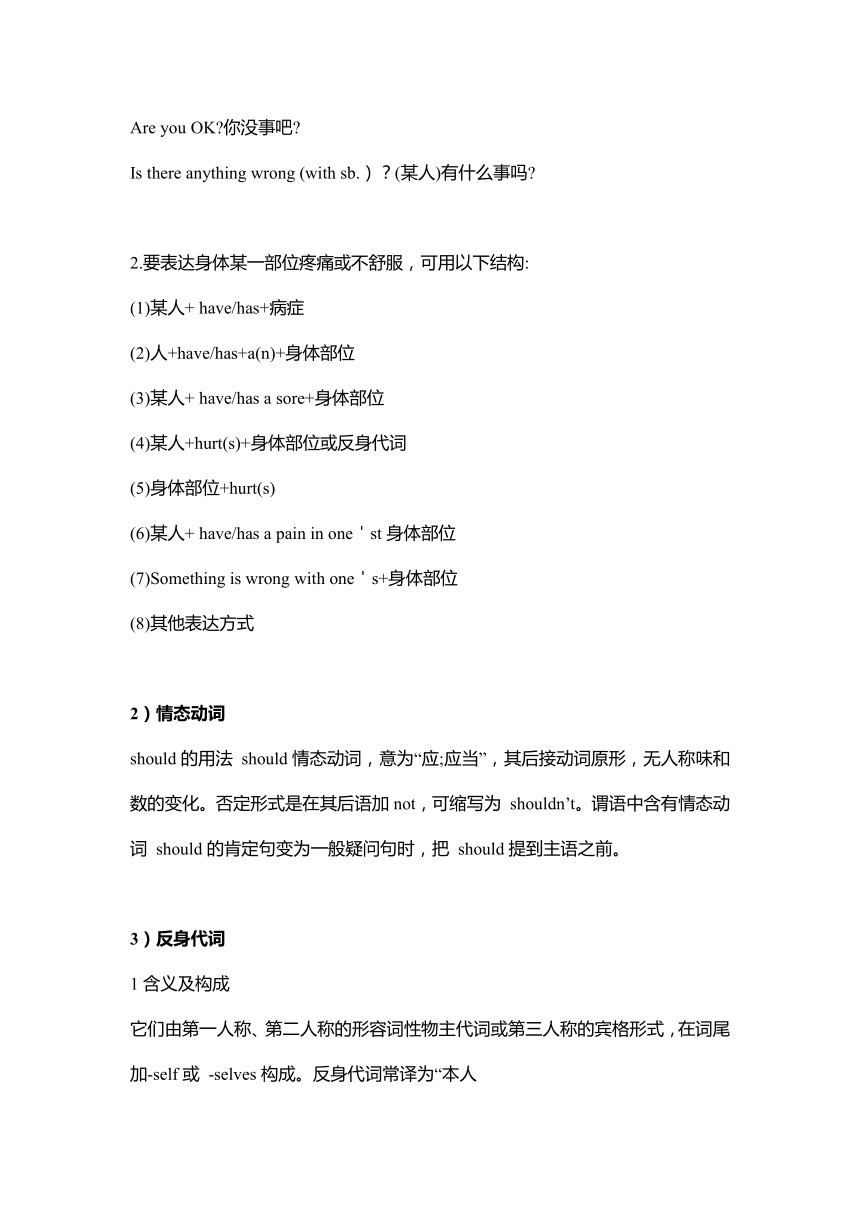Unit 1 What's the matter?单元知识点与语法总结2023-2024学年人教版英语八年级下册(无答案)
文档属性
| 名称 | Unit 1 What's the matter?单元知识点与语法总结2023-2024学年人教版英语八年级下册(无答案) |

|
|
| 格式 | docx | ||
| 文件大小 | 24.8KB | ||
| 资源类型 | 教案 | ||
| 版本资源 | 人教新目标(Go for it)版 | ||
| 科目 | 英语 | ||
| 更新时间 | 2024-01-26 00:00:00 | ||
图片预览




文档简介
Unit 1 What’s the matter
一、重点词组
have a fever/cold/cough
go along
put a bandage on…
have a toothache/stomachache
shout for help
fall down
have a sore throat
without thinking twice
get hit on the head
lie down
get off
have problems breathing
get an X-ray
to one’s surprise
be used to doing
take one’s temperature
thanks to
take risks
cut oneself
in time
run out of
put some medicine on..
get into trouble
be in control of
take breaks
right away
in a difficult situation
in the same way
hurt oneself
keep on doing sth
the importance of…
make a decision
give up
二、知识点解析
sick adj. “生病的;恶心的”(表语&定语)
be sick of “对……厌倦”
tell sb (not)to do sth “告诉某人(不要)做某事”
have problems /trouble/ difficulty (in) doing sth “做某事有困难”
out of breath “上气不接下气” take a deep breath “深呼吸”
interesting “令人感到有趣的”(修饰物) interested “感到有趣的”(修饰人)
be interested in “对……感兴趣”
be/get used to doing sth “习惯于……”
used to do sth “过去常常做某事”
be used to do sth “被用来做某事”
take risks /take a risk “冒险” the risk of “……的风险”
because of +名词、代词或动名词 because+从句
run out “用尽;耗尽”(主语通常是时间、食物、金钱等)
save one’s life “挽救某人的生命”
be ready to do sth “准备好做某事” be ready for sth “为……作准备”
use sth to do sth “用某物做某事”
cut off 切除;切断 cut down 砍到;减少
cut up 切碎 cut in 插入;插话
cut...into... 把……切成……cut out 删掉;割去
so that “为了;因为(so that前可用逗号 )”
so...that... “太……以至于……”
What do you mean by... =What do/does...mean =What’s the meaning of... “……是什么意思”
mean to do sth “打算做某事”
get out of “从……出来” 反:get into “进入”
tell of “叙述;描述”
the importance of(doing)sth “做某事的重要性”
make a decision/decisions “做决定”
make a decision to do sth =decide to do sth“决定做某事”
be in control of “掌管;管理”be in the control of “受……控制”
keep on doing sth “继续做某事”(动作重复多次,中间有间隔)
keep doing sth “继续不停地做某事”(持续不间断)
keep sb doing sth “使某人一直做某事”
keep sb from doing sth “阻止某人做某事”
mind doing sth “介意做某事”
give up “放弃” give out 分发 give away 赠送;分发
单元语法
1)询问某人的身体状况
1.询问某人患了何种疾病或遇到了何种麻烦时,常用以下几种结构来表达:
What's the matter( with sb.) (某人)怎么了
What' s wrong( with sb.) (某人)怎么了
What's the trouble (with sb. ) /what's ones trouble (某人)出什么事了
What happened(to sb) (某人)发生什么事了
Are you OK 你没事吧
Is there anything wrong (with sb.)?(某人)有什么事吗
2.要表达身体某一部位疼痛或不舒服,可用以下结构:
(1)某人+ have/has+病症
(2)人+have/has+a(n)+身体部位
(3)某人+ have/has a sore+身体部位
(4)某人+hurt(s)+身体部位或反身代词
(5)身体部位+hurt(s)
(6)某人+ have/has a pain in one'st身体部位
(7)Something is wrong with one's+身体部位
(8)其他表达方式
2)情态动词
should的用法 should情态动词,意为“应;应当”,其后接动词原形,无人称味和数的变化。否定形式是在其后语加not,可缩写为 shouldn’t。谓语中含有情态动词 should的肯定句变为一般疑问句时,把 should提到主语之前。
3)反身代词
1含义及构成
它们由第一人称、第二人称的形容词性物主代词或第三人称的宾格形式,在词尾加-self或 -selves构成。反身代词常译为“本人
人称 第一人称 第二人称 第三人称
单数 myself yourself herself/himself/itself
复数 ourselves yourselves themselves
2.含有反身代词的常用短语
enjoy oneself玩得高兴
hurt/cut oneself/伤/割着自己
by oneself独自,单独
believe in oneself相信自己
help oneself to随便吃/喝
teach oneself. /learn by oneself自学
lose oneself in迷恋,沉醉于
课堂练习
一、单项选择
1.Please __ your temperature and tell me if you have a fever.
A.have B.catch C.take D.test
2.—Why are you so angry, Mrs. Smith
—My son ________ in bed all the morning and did nothing, but he ________ to me about that.
A.lied; lied B.lay; lay C.lied; lay D.lay; lied
3.Could you please give me a hand I can’t complete the task on time your help.
A.without B.under C.with D.for
4.The bus is coming. Be careful when you the bus.
A.get on B.get off C.get up D.get to
5.I had so much trouble her Wechat (微信) number. You should thank me.
A.to get B.getting C.gets D.get
6.—What was the matter with you
—______________.
A.I passed my math exam B.I found my library book
C.I broke my bike D.He lost his dictionary
7.You shouldn’t eat_______-food, or you’ll be ________ fat.
A.too much; much too B.too much; too much
C.much too; too much D.much too; much too
8.Tony is thinking about ___________ a new bike.
A.buy B.to buy C.buys D.buying
9.Alice is interested in ______________ the Internet.
A.surf B.surfing C .to surf D .surfs
10. __________her surprise, she felt better after having a rest.
A.In B.On C.To D.At
二、用所给单词适当形式填空。
1. He is always careless about his schoolwork, so he keeps_________(make)
the same mistakes.
2.To complete the work, he drank some coffee to keep himself_________(wake).
3.Unluckily, the man___________(hurt) badly in the accident.
4.I am used to_____________(drink) a glass of water after getting up every morning.
5.I saw Jack____________(clean) the classroom when I came in.
6. The bus _________(hit) a tree and fell down.
7. They walked near the sea and found many people ________ (lie) on the beach.
8.A man put out his arm and __________ (stop) a taxi.
9.He jumped off the bus __________ (quick) as soon as it stopped.
10.Our teachers expected us ________ (do) well in our lessons.
三、根据汉语提示完成句子
1.他期待所大部分或者所有乘客下车,并等待下一辆车__________________________________________。
2.令他惊讶的是,他们同意和他一起去。__________________________________________。
3.多亏了王先生和乘客,这位老人被医生及时救治。__________________________________________。
4.令人难过的是,许多人不想帮助别人,因为他们不想有任何的麻烦。__________________________________________。
5.司机没有考虑自己,他仅仅考虑挽救生命。__________________________________________。
6.父母们都期待着我们在学校努力学习。
___________________________________________
7.Gina不假思索就把那本书给我了。
___________________________________________
8.让老师惊讶的是,Helen八点前就到了学校。
___________________________________________
9.你同意帮助他吗?
___________________________________________
四、句型转换
1.You should drink some water.(改为否定句)
You ____ drink ______ water.
2.I have a stomachache.(就画线部分提问)
_____ the ____ with you
3.The film started about two hours ago.(就画线部分提问)
______ did the film______ ?
4.Jack has a headache. Have a toothache.(改为选择疑问句)
_____Jack have a headache ______ a toothache
5.She usually watches TV on weekends.(就画线部分提问)
_____ does she usually _____ on weekends
一、重点词组
have a fever/cold/cough
go along
put a bandage on…
have a toothache/stomachache
shout for help
fall down
have a sore throat
without thinking twice
get hit on the head
lie down
get off
have problems breathing
get an X-ray
to one’s surprise
be used to doing
take one’s temperature
thanks to
take risks
cut oneself
in time
run out of
put some medicine on..
get into trouble
be in control of
take breaks
right away
in a difficult situation
in the same way
hurt oneself
keep on doing sth
the importance of…
make a decision
give up
二、知识点解析
sick adj. “生病的;恶心的”(表语&定语)
be sick of “对……厌倦”
tell sb (not)to do sth “告诉某人(不要)做某事”
have problems /trouble/ difficulty (in) doing sth “做某事有困难”
out of breath “上气不接下气” take a deep breath “深呼吸”
interesting “令人感到有趣的”(修饰物) interested “感到有趣的”(修饰人)
be interested in “对……感兴趣”
be/get used to doing sth “习惯于……”
used to do sth “过去常常做某事”
be used to do sth “被用来做某事”
take risks /take a risk “冒险” the risk of “……的风险”
because of +名词、代词或动名词 because+从句
run out “用尽;耗尽”(主语通常是时间、食物、金钱等)
save one’s life “挽救某人的生命”
be ready to do sth “准备好做某事” be ready for sth “为……作准备”
use sth to do sth “用某物做某事”
cut off 切除;切断 cut down 砍到;减少
cut up 切碎 cut in 插入;插话
cut...into... 把……切成……cut out 删掉;割去
so that “为了;因为(so that前可用逗号 )”
so...that... “太……以至于……”
What do you mean by... =What do/does...mean =What’s the meaning of... “……是什么意思”
mean to do sth “打算做某事”
get out of “从……出来” 反:get into “进入”
tell of “叙述;描述”
the importance of(doing)sth “做某事的重要性”
make a decision/decisions “做决定”
make a decision to do sth =decide to do sth“决定做某事”
be in control of “掌管;管理”be in the control of “受……控制”
keep on doing sth “继续做某事”(动作重复多次,中间有间隔)
keep doing sth “继续不停地做某事”(持续不间断)
keep sb doing sth “使某人一直做某事”
keep sb from doing sth “阻止某人做某事”
mind doing sth “介意做某事”
give up “放弃” give out 分发 give away 赠送;分发
单元语法
1)询问某人的身体状况
1.询问某人患了何种疾病或遇到了何种麻烦时,常用以下几种结构来表达:
What's the matter( with sb.) (某人)怎么了
What' s wrong( with sb.) (某人)怎么了
What's the trouble (with sb. ) /what's ones trouble (某人)出什么事了
What happened(to sb) (某人)发生什么事了
Are you OK 你没事吧
Is there anything wrong (with sb.)?(某人)有什么事吗
2.要表达身体某一部位疼痛或不舒服,可用以下结构:
(1)某人+ have/has+病症
(2)人+have/has+a(n)+身体部位
(3)某人+ have/has a sore+身体部位
(4)某人+hurt(s)+身体部位或反身代词
(5)身体部位+hurt(s)
(6)某人+ have/has a pain in one'st身体部位
(7)Something is wrong with one's+身体部位
(8)其他表达方式
2)情态动词
should的用法 should情态动词,意为“应;应当”,其后接动词原形,无人称味和数的变化。否定形式是在其后语加not,可缩写为 shouldn’t。谓语中含有情态动词 should的肯定句变为一般疑问句时,把 should提到主语之前。
3)反身代词
1含义及构成
它们由第一人称、第二人称的形容词性物主代词或第三人称的宾格形式,在词尾加-self或 -selves构成。反身代词常译为“本人
人称 第一人称 第二人称 第三人称
单数 myself yourself herself/himself/itself
复数 ourselves yourselves themselves
2.含有反身代词的常用短语
enjoy oneself玩得高兴
hurt/cut oneself/伤/割着自己
by oneself独自,单独
believe in oneself相信自己
help oneself to随便吃/喝
teach oneself. /learn by oneself自学
lose oneself in迷恋,沉醉于
课堂练习
一、单项选择
1.Please __ your temperature and tell me if you have a fever.
A.have B.catch C.take D.test
2.—Why are you so angry, Mrs. Smith
—My son ________ in bed all the morning and did nothing, but he ________ to me about that.
A.lied; lied B.lay; lay C.lied; lay D.lay; lied
3.Could you please give me a hand I can’t complete the task on time your help.
A.without B.under C.with D.for
4.The bus is coming. Be careful when you the bus.
A.get on B.get off C.get up D.get to
5.I had so much trouble her Wechat (微信) number. You should thank me.
A.to get B.getting C.gets D.get
6.—What was the matter with you
—______________.
A.I passed my math exam B.I found my library book
C.I broke my bike D.He lost his dictionary
7.You shouldn’t eat_______-food, or you’ll be ________ fat.
A.too much; much too B.too much; too much
C.much too; too much D.much too; much too
8.Tony is thinking about ___________ a new bike.
A.buy B.to buy C.buys D.buying
9.Alice is interested in ______________ the Internet.
A.surf B.surfing C .to surf D .surfs
10. __________her surprise, she felt better after having a rest.
A.In B.On C.To D.At
二、用所给单词适当形式填空。
1. He is always careless about his schoolwork, so he keeps_________(make)
the same mistakes.
2.To complete the work, he drank some coffee to keep himself_________(wake).
3.Unluckily, the man___________(hurt) badly in the accident.
4.I am used to_____________(drink) a glass of water after getting up every morning.
5.I saw Jack____________(clean) the classroom when I came in.
6. The bus _________(hit) a tree and fell down.
7. They walked near the sea and found many people ________ (lie) on the beach.
8.A man put out his arm and __________ (stop) a taxi.
9.He jumped off the bus __________ (quick) as soon as it stopped.
10.Our teachers expected us ________ (do) well in our lessons.
三、根据汉语提示完成句子
1.他期待所大部分或者所有乘客下车,并等待下一辆车__________________________________________。
2.令他惊讶的是,他们同意和他一起去。__________________________________________。
3.多亏了王先生和乘客,这位老人被医生及时救治。__________________________________________。
4.令人难过的是,许多人不想帮助别人,因为他们不想有任何的麻烦。__________________________________________。
5.司机没有考虑自己,他仅仅考虑挽救生命。__________________________________________。
6.父母们都期待着我们在学校努力学习。
___________________________________________
7.Gina不假思索就把那本书给我了。
___________________________________________
8.让老师惊讶的是,Helen八点前就到了学校。
___________________________________________
9.你同意帮助他吗?
___________________________________________
四、句型转换
1.You should drink some water.(改为否定句)
You ____ drink ______ water.
2.I have a stomachache.(就画线部分提问)
_____ the ____ with you
3.The film started about two hours ago.(就画线部分提问)
______ did the film______ ?
4.Jack has a headache. Have a toothache.(改为选择疑问句)
_____Jack have a headache ______ a toothache
5.She usually watches TV on weekends.(就画线部分提问)
_____ does she usually _____ on weekends
同课章节目录
- Unit 1 What's the matter?
- Section A
- Section B
- Unit 2 I'll help to clean up the city parks.
- Section A
- Section B
- Unit 3 Could you please clean your room?
- Section A
- Section B
- Unit 4 Why don't you talk to your parents?
- Section A
- Section B
- Unit 5 What were you doing when the rainstorm came
- Section A
- Section B
- Review of Units 1-5
- Unit 6 An old man tried to move the mountains.
- Section A
- Section B
- Unit 7 What's the highest mountain in the world?
- Section A
- Section B
- Unit 8 Have you read Treasure Island yet?
- Section A
- Section B
- Unit 9 Have you ever been to a museum?
- Section A
- Section B
- Unit 10 I've had this bike for three years.
- Section A
- Section B
